Berlin (VNA) – The multinational financial group HSBC held a webinar on July 1 to introduce business opportunities in the Association of South East Asian Nations (ASEAN) for European Union and UK businesses.
Participants at the event said amid rising labour costs, concern over supply chains and geo-political tension, foreign firms are moving their production facilities to ASEAN member states, with Singapore, Indonesia and Vietnam receiving over 80 percent of new capital flows in 2019.
Nguyen Manh Hai, Counsellor in charge of investment at the Vietnamese Embassy in Germany, highlighted growth opportunities in Vietnam as well as chances that the EU and UK firms could grasp.
He said Vietnam has long pursued the policy of shifting its economic structure towards improving growth quality, labour productivity and economic competitiveness.
At the same time, the country has also stepped up institution reform to better pool resources and create a new driving force for development. It encouraged the growth of export-oriented and foreign-invested sectors.
Apart from positive impacts of new-generation free trade deals such as the EU-Vietnam Free Trade Agreement (EVFTA), the UK-Vietnam FTA (UKVFTA), the Comprehensive and Progressive Agreement for Trans-Pacific Partnership (CPTPP) and the Regional Comprehensive Economic Partnership (RCEP), socio-political stability in Vietnam also made it attractive for foreign enterprises, he said.
He added that the Vietnam is working on a strategy on foreign investment cooperation for the 2021-2030 period, which will include a road map to attract new-generation foreign direct investment.
Hai went on to announce several investment promotion activities that Vietnam will hold in the time ahead, one of which is the piloting of vaccine passport in the northern province of Quang Ninh this month.
He said Vietnam has long pursued the policy of shifting its economic structure towards improving growth quality, labour productivity and economic competitiveness.
At the same time, the country has also stepped up institution reform to better pool resources and create a new driving force for development. It encouraged the growth of export-oriented and foreign-invested sectors.
Apart from positive impacts of new-generation free trade deals such as the EU-Vietnam Free Trade Agreement (EVFTA), the UK-Vietnam FTA (UKVFTA), the Comprehensive and Progressive Agreement for Trans-Pacific Partnership (CPTPP) and the Regional Comprehensive Economic Partnership (RCEP), socio-political stability in Vietnam also made it attractive for foreign enterprises, he said.
He added that the Vietnam is working on a strategy on foreign investment cooperation for the 2021-2030 period, which will include a road map to attract new-generation foreign direct investment.
Hai went on to announce several investment promotion activities that Vietnam will hold in the time ahead, one of which is the piloting of vaccine passport in the northern province of Quang Ninh this month.
Vietnam is also planning to hold the Vietnam Digital Investment Forum 2021 scheduled for the third quarter and build a portal to introduce opportunities in economic and industrial zones, besides several other investment promotion forums and seminars.
According to Hai, Vietnam ran a trade surplus of over 29.3 billion USD with the EU last year. Two-way trade between Vietnam and the EU reached 49.78 billion USD last year, down just 0.1 percent year-on-year despite the COVID-19 pandemic. The EU is the second largest importer of Vietnam, behind the US.
Vietnam imported goods worth 14.64 billion USD from the EU last year, up 4.27 percent annually.
Discussions at the webinar focused on growth trend, competitive edges and technological advances in ASEAN, especially Vietnam as the next global manufacturing hub./.
VNA

























